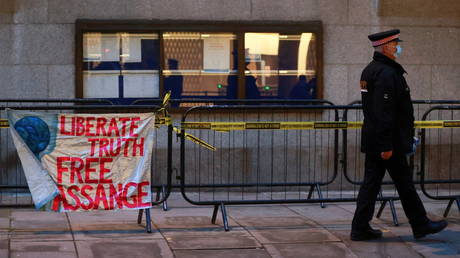
The UK court has spared WikiLeaks founder Julian Assange from extradition to the US, but Monday’s ruling came as a grim verdict for free speech, Fidel Narvaez, a former Consul at the Ecuadorian embassy in London, told RT.
The fact that the US request to extradite Assange was rejected is a “victory to celebrate,” Narvaez said. But the British judge’s ruling is also a very “worrying” sign, since the WikiLeaks founder was only spared from extradition due to his health condition and the risk of suicide, the former diplomat said.
“This is very, very worrying that the judge basically criminalized journalistic activity,” Narvaez said, adding that, were it not for his poor state of health, Assange “would be extradited.” The former consul, who played a role in helping Assange get refuge at the Ecuadorian embassy in London, then warned that such an outcome is a reason for concern to all other journalists around the world.
Narvaez also believes that, although an important battle has been won, many more still lie ahead, given that Washington is unlikely to abandon its persecution of Assange until the US authorities have some “options available.”
“They want to set a precedent with him,” Narvaez believes. He also says that the precedent might have already been set, since the decade-long persecution has dealt “irreversible” damage to the WikiLeaks founder’s physical and psychological health.
These concerns are shared by John Rees, the organizer of the Don’t Extradite Assange Campaign, who also noted that “95 percent of [the judge’s]remarks were in favor of the US and in favor of extradition.” Rees believes that the fate of the freedom of the press is still hanging in limbo, particularly in the UK.
He adds that although the judge eventually ruled in favor of the WikiLeaks founder and not the US government, she still denied the case had any “public interest” and also denied it was in any way political. Such a ruling leaves journalists who do their job and behave like proper journalists virtually without any legal defense, Rees believes.
The very existence of the US Espionage Act poses a “threat” to any journalist, who “dares” to publish anything not to Washington’s liking, according to Narvaez.
On Monday, Judge Vanessa Baraitser denied the US request to extradite Assange in an unexpected decision that was celebrated and cheered by his supporters in London and beyond. The WikiLeaks founder is charged with 18 counts of conspiring to hack US government computers and with the publication of confidential military records, and could face up to 175 years behind bars if extradited and convicted in the US.
Assange’s legal team believes the US will likely appeal Baraitser’s decision in London’s High Court and possibly take the case as far as the UK’s Supreme Court. Following the court ruling, Assange returned to Belmarsh Prison, to await a bail hearing on Wednesday.
Think your friends would be interested? Share this story!




